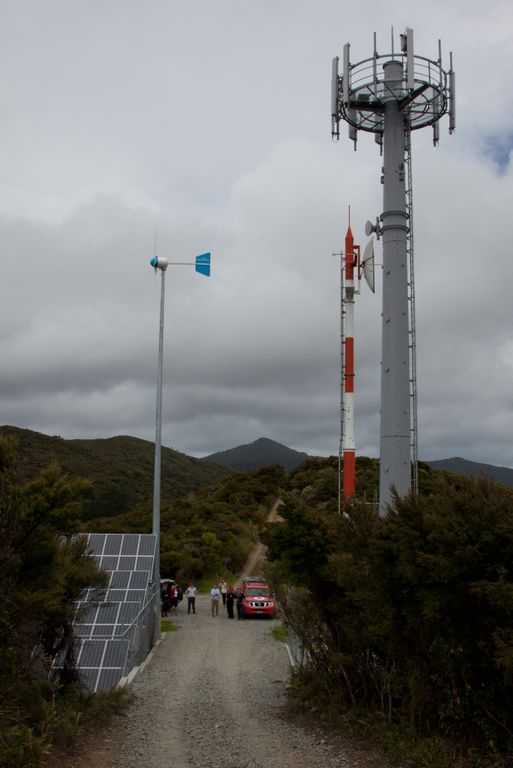Vodafone doubles capacity in Auckland, brings Rural Broadband Initiative to Great Barrier
PLUS: Telecom, 2degrees give progress report on their mobile upgrades.
PLUS: Telecom, 2degrees give progress report on their mobile upgrades.
Wireless broadband is now live on Great Barrier Island, courtesy of the government's six-year, $300 million Rural Broadband Initiative (won by a joint tender from Vodafone and Chorus. The RBI is partly funded by a levy on the telecommunications industry, and partly through a direct government grant of $50 million)
Under the agreement, 154 new cellphone towers will be built by Vodafone, 387 cellphone towers will be upgraded and Chorus’ existing fibre network will be extended by about 3100 kilometres.
A wireless broadband tower at Claris (the 31st erected under the public-private RBI) will deliver fast internet and mobile phone coverage to 210 Great Barrier households and businesses between Awana Bay and Jack Ryan Bay, will generate its own power via solar panels and a wind turbine. Energy will be captured in a large battery system, with two diesel generators providing reliable backup if required.

ABOVE: The $1 million tower (right) is powered by solar panels, a wind turbine, plus diesel generators as backup. The stripped pole holds a microwave backhaul link for landline networks.
As with other celltowers erected under the Rural Broadband Initiative, the government covered site acquisition and construction cost, while Vodafone - which will operate its Great Barrier Island service on a commercial basis - stumped for the electronics. All told, the Great Barrier project cost around $1 million.
Why should the taxpayer subsidise broadband service for a Hauraki Gulf island, best known as a lifestyle destination more than a rural area?
Great Barrier receives about 30,000 tourists a year and has 1000 residents.
"Better cellphone coverage can potentially help to attract more people [tourists and residents] here," Prime Minster John Key said at the opening ceremony today
"People with a job like mine can't go somewhere and not be contactable," said Mr Key, who was flanked by ICT Minister Any Adams and Auckland Central MP and recent addition to cabinet Nikki Kaye.
The Great Barrier tower also means better coverage for any boaties who get into trouble in the area, the Prime Minster adds.
Vodafone doubles capacity in Auckland
Back on the mainland, Vodafone says it has doubled the capacity of its 3G mobile network in Auckland.
350 of its 400 cellsites in the city now support "Dual Carrier" technology that doubles mobile data download speed. Vodafone has also upgraded the towers to run on both 900MHz and 2100MHz bands. "Together, these frequencies allow mobile signal to travel further and deeper into built-up areas – and doubles the capacity of the network," the company said in a statement.
The catch: at the moment there are few Dual Carrier (DC) devices on the moment - although Vodafone has nine in its line up: the iPhone 5, iPad Mini, iPad Retina Display, Nokia 820, HTC 8X, Samsung GS3 DC Samsung Galaxy Note II, Vodafone R208 (Wifi Hotspot) and Vodafone Stick K4605.
Vodafone has also upgraded parts of the Wellington CBD. Chief network officer Tony Baird says 50% of the company's 3G network - covering 70% of the population - will have been given the 3G turbo-boost by April.
2degrees and Telecom are embarking on their own Dual Carrier upgrades.
2degrees says it will have 50% coverage by the end of the year, with unspecified areas of Auckland, Wellington and Christchurch already upgraded.
Telecom says it has already upgraded half of its network, over a spread of main centres (see coverage map here).
Keenest industry attention remains on the government's plan to auction 4G-friendly 700MHz spectrum freed up by the digital TV switchover. Today, a spokesman for IT & Communications Minister Amy Adams told NBR the auction would be staged "well before the end of the year."
Phone companies had been hoping the auction would take place as early as December last year. But the date slipped into early this year, and now later still.
The government is grappling with a number of complications, including a Treaty claim on spectrum, supported by the Maori Party, and a push by 2degrees to be allocated spectrum "at a fair price" to help compensate for Telecom and Vodafone owning more airwaves and keep the market competitive.
Follow @ChrisKeall Follow @georginabond
ckeall@nbr.co.nz / gbond@nbr.co.nz